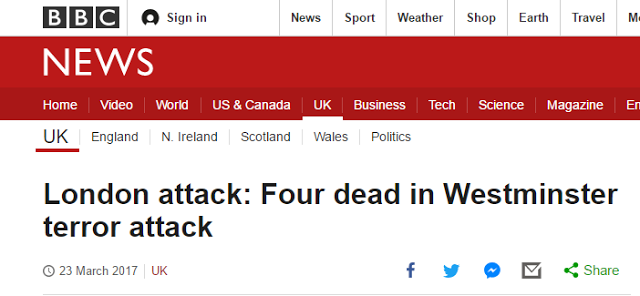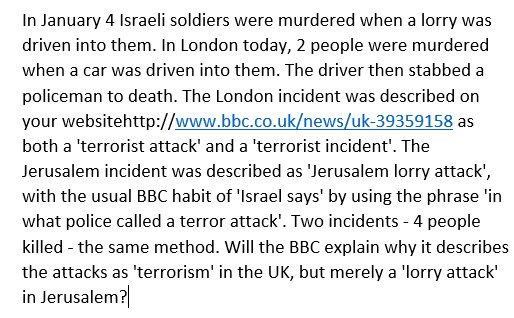
The BBC used the word “terror” without scare quotes to describe the March attack on Westminster Bridge.
The BBC had no compunctions about using the term “terror” even before the attacker was identified and before any motive was known.
Neil Turner complained to the BBC about why they consider this attack to be terrorism and not the many terror attacks against Israel.
 The answer is illuminating, but not in the way the BBC intended:
The answer is illuminating, but not in the way the BBC intended:
Thank you for getting in touch about our report on the attack carried out on Westminster Bridge in London and please accept our apologies for the delay in our response.
The BBC sets out clear parameters on how terms such as “terrorist” might be used:
http://www.bbc.co.uk/editorialguidelines/guidance/terrorism-language/guidance-full
Where there is an ongoing geopolitical conflict – as in the Middle East – to use the term “terror attack” or similar might be seen to be taking sides. There are those who might consider the actions of the Israeli government to be considered as terrorist acts.
In a situation where a country that is not involved in a direct physical combat comes under attack, it may be reasonable to construe that as a terrorist incident.
The use of such terminology is never an exact science but where a continuing conflict exists, it is reasonable that the BBC would not wish to appear to be taking sides.
Thank you again for raising this matter.
The BBC explanation that “There are those who might consider the actions of the Israeli government to be considered as terrorist acts” as justification for this policy is simple hypocrisy.
Many of those same people would also consider British airstrikes in the Middle East to be terrorism as well, so what’s the difference?
There is no logic to saying that attacking Israeli civilians is not terrorism but attacking British civilians is terrorism simply because Israel happens to be located in the Middle East.
The hypocrisy doesn’t end there. This explanation is at odds with the BBC’s own guidelines. The link that the BBC points to makes no such distinction between whether the location of an attack is in a conflict zone or not. On the contrary, it says that reporters should avoid using the term as much as possible altogether:
We try to avoid the use of the term “terrorist” without attribution. When we do use the term we should strive to do so with consistency in the stories we report across all our services and in a way that does not undermine our reputation for objectivity and accuracy.
The word “terrorist” itself can be a barrier rather than an aid to understanding. We should convey to our audience the full consequences of the act by describing what happened. We should use words which specifically describe the perpetrator such as “bomber”, “attacker”, “gunman”, “kidnapper”, “insurgent”, and “militant”. We should not adopt other people’s language as our own; our responsibility is to remain objective and report in ways that enable our audiences to make their own assessments about who is doing what to whom.
The guidelines conclude “This is an issue of judgement. If you do decide to use the word ‘terrorist’ do so sparingly, having considered what is said above, and take advice from senior editors.”
By their own standards, the Westminster Bridge incident should not have been referred to as terrorism, especially before a suspect and possible motive was uncovered.
Which means that “senior editors” have made up this new arbitrary rule about how attacks in Israel are not terror while potentially random attacks in Britain are, and they justify it by using their own anti-Israel bias claiming that Israeli military action can be considered terrorist while (by implication) identical British military actions cannot be given that title.
The BBC’s use of the word “terrorist” in this case and its justification for the term in near-contradiction to its own published guidelines shows fairly clear anti-Israel bias.
We have lots of ideas, but we need more resources to be even more effective. Please donate today to help get the message out and to help defend Israel.


Leave a Reply